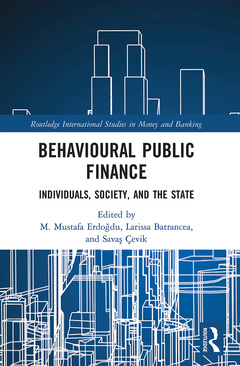Description
Behavioural Public Finance
Individuals, Society, and the State
Routledge International Studies in Money and Banking Series
Language: English
Subjects for Behavioural Public Finance:
Keywords
Wolfgang Amadeus Mozart; Behavioral Microeconomics; Qualitative Focus Group Study; Public Finance; Tax Evasion Behavior; Fiscal Policies; Tax Compliance; Economics and Social Values; Tax Morale; Public Economics; Cumulative Abnormal Returns; Taxation; Subsidies and Revenue; Tax Amnesties; Behavioral Finance; Tax Avoidance; behavioural public finance; Behavioral Economics; behavioural economics; Tax Evasion; tax behaviour; GAARs; Efficient Market Hypothesis; fiscal relationship; Reputational Loss; Fiscal exchange; Expected Utility; Voluntary Tax Compliance; Political governance; Financial Service Providers; Public finance policy; Hm Revenue; Exit Tax; Tax Evasion Acts; UK Unit; Lucas Critique; Expected Utility Theory; Scienza Delle Finanze; Mystery Shoppers; UK Uncut
Publication date: 05-2022
Support: Print on demand
Publication date: 11-2020
· 15.6x23.4 cm · Hardback
Description
/li>Contents
/li>Readership
/li>Biography
/li>
This book tackles political, social, and behavioural aspects of public finance and fiscal exchange. The book combines conventional approaches toward public finance with new developments in economics such as political governance, social and individual aspects of economic behaviour. It colligates public finance and behavioural economics and gathers original contributions within the emerging field of behavioural public finance.
The book addresses public finance topics by incorporating political, social, and behavioural aspects of economic decision-making, assuming the tax relationship is shaped by three dimensions of decision-making. Thus, it aims not only to reflect the interdisciplinary nature of public finance by bringing together scholars from various disciplines but also to examine public finance through the lens of political, social, and behavioural aspects. The book scrutinizes the relationship between political institutions, governance types, and public finance; it investigates the impact of social context, social capital, and societal cooperation on public finance; it explores behavioural biases of individual fiscal preferences.
This book is of interest to scholars, policymakers, tax professionals, business professionals, financers, university students, and researchers in the fields of public policy and economics.
Book Overview PART ONE – THEORETICAL CONSIDERATIONS ON BEHAVIOURAL PUBLIC FINANCE 1. Behavioral Public Finance in a Populist World 2. Smart Decision-Makers, Institutional Design and X-Efficient (Real World Optimal) Public Finance 3. Behavioral Economics and Public PolicyPART TWO – BEHAVIOURAL RESPONSES TO REGULATIONS 4. Financial Decisions and Financial Regulation: Three Concepts of Performance-Based Regulation 5. Behavioral Biases and Political Actors: Three Examples from US International Taxation 6. Varieties of General Anti-Avoidance Legislation PART THREE – TAX COMPLIANCE BEHAVIOUR: CASES 7. Political Economy of Tax Compliance Behavior: An Analysis of Three Cities in Turkey 8. Incidental Emotions, Integral Emotions, and Decisions to Pay Taxes 9. Moral Concerns and Personal Beliefs regarding Tax Evasion: Empirical Results from Germany, Romania, Turkey, and the United Kingdom 10. Paying Is Caring? Prosociality and Gender in Fiscal Compliance 11. Tax Compliance Theories and Fiduciary Taxes: Do the Shoes Fit? 12. How to Tax the Powerful and the Sophisticated? 13. Starbucks and Media Allegations of Tax Avoidance: An Examination of Reputational Loss 14. The Effect of Media on Tax Compliance: Hypothetical Scenarios Study
M. Mustafa Erdoğdu is Professor of Economics at Marmara University, Istanbul, Turkey, where he is head of the Financial Economics division. He received his MA and PhD in development economics from Manchester University, UK. His research interests are economic development, public finance, international political economy, institutions, financial crises, sustainability, and renewable energies.
Larissa Batrancea is Associate Professor of Corporate Finance at Babes-Bolyai University, Cluj-Napoca, Romania. Her research addresses tax behaviour, experimental economics, neuroeconomics, financial analysis. She activated as principal investigator/member in 16 international/national research grants. She has been awarded 12 prizes for excellence in research and teaching.
Savaş Çevik is a Professor in the Department of Economics at Selcuk University in Turkey. He received his MS and PhD degrees in public finance from Marmara University. His research interests are in public economics, the economics and politics of taxation, and behavioural economics.
These books may interest you

Behavioural Economics and Finance 160.25 €



